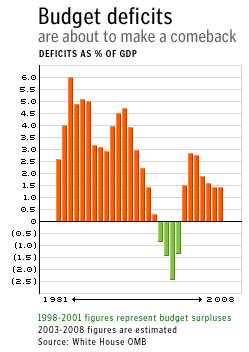NEW YORK (CNN/Money) -
Delay the victory parade, Democrats -- reports of the death of the Bush plan are probably premature.
Though Federal Reserve Chairman Alan Greenspan delivered a blow this week to President Bush's $1.3 trillion plan to give the economy a lift, many analysts said Congress may yet give the president a good bit of his wish list.
Greenspan, in his semi-annual report to Congress on the state of the economy, said he thought it was premature to enact tax and spending measures to goose the moribund economy, and went even further, warning of the serious economic damage that could result from swelling federal budget deficits.

Democrats opposed to Bush's tax cut and spending proposals took a victory lap Wednesday, led by Sen. Tom Daschle, D-S.D., who called Greenspan's remarks the "kiss of death" for the Bush plan. More important, however, could be the impact of Greenspan's remarks on Republicans, who spent the 1980s and 1990s railing against budget deficits.
"The fault line here is really among the fiscally conservative Republicans, who are uneasy about deficits," said Norman Ornstein, political analyst at the American Enterprise Institute, a conservative think tank in Washington.
"It was very significant two years ago when Greenspan endorsed the first Bush tax cut plan," Ornstein added. "So his basically lukewarm attitude now, saying that some of these ideas are good things in principle, but not at the expense of large deficits, has to weigh heavily on those moderate Republicans."
But while some of Bush's proposals might land on the cutting-room floor during the weeks of debate to come, many could survive, economists said, including:
- A plan to cut or eliminate most personal taxes on corporate dividends;
- An acceleration of the child tax credits, "marriage penalty" relief, and tax-rate cuts passed in 2001; and
- "Re-employment accounts" with money paid to some unemployed workers to help them find jobs.
"The Democrats will try to make hay out of Greenspan's comments, but I don't think it will stick," said Christian Weller, economist at the Economic Policy Institute (EPI), a liberal think tank in Washington. The EPI opposes the Bush plan and recently ran a full-page statement in the New York Times, signed by 300 economists, including 10 Nobel laureates, explaining their problems with it.
The EPI echoes the concerns of many Democrats, who think that Bush's plan gives too much money to corporations and upper-income families to really be of much benefit to the economy, while helping to bring on record budget deficits in 2003 and 2004, according to White House estimates.
"If you're going to have a stimulus plan it ought to be immediate, it ought to be very limited in time, and it ought not be fiscally irresponsible," Sen. Daschle told reporters Wednesday. "That is exactly what our Democratic plans do."
Daschle and his fellow Democrats have proposed a much more modest plan, costing about $136 billion, that would extend unemployment benefits, give money to cash-strapped states and provide other short-term shots in the arm.
While it would seem that the go-slow comments from Greenspan -- called "the Maestro" in some circles and seen by many as an economic visionary -- could inspire legislators to adopt the more moderate approach of the Democrats, some analysts noted that Greenspan didn't have much clout with Republicans anyway.
Sen. Charles Grassley, R-Iowa, chairman of the Senate Finance Committee, might have had more impact on conservatives Wednesday when he said Congress would go along with most of Bush's ideas and added he was mistaken earlier this year when he criticized Bush's plan to eliminate dividend taxes.
"I think I should have kept my mouth shut back in January," Grassley told reporters, according to Reuters. Grassley is seen by some as a moderate, and his support of the Bush plan, in the face of Greenspan's criticisms, made an impression on conservatives.
"He's way more important than Greenspan," said Chris Edwards, director of fiscal policy at the Cato Institute, a conservative think tank. "I guess he sways some of the moderates."
What's more, Bush supporters had already heard many of Greenspan's arguments, and some of Bush's proposals, especially ending taxes on most dividends, were already under heavy assault.
"Alan Greenspan's highly respected, and [his comments] can't help Bush, but it's early in the process, and we never really did think the president's proposal would sail through as drafted," said Hank Cox, spokesman for the National Association of Manufacturers, which has been a staunch supporter of the Bush plan.
If Greenspan's comments did anything, they probably gave Congress the green light to avoid debating the proposal for several more weeks. Greenspan said he thought the U.S. economy, which has struggled to recover fully from a recession that began in March 2001, was basically holding its breath until the trouble with Iraq passed.
After the Iraqi situation is off the radar screen -- solved either by diplomacy or what will ostensibly be a quick war -- then policy-makers will have a better idea of what medicine, if any, the economy needs, Greenspan said.
"The debate on tax cuts will be pushed off to late April or May," said John Barry, chief economist at the Tax Foundation, a conservative think tank in Washington.

-- CNN/Money Senior Writer Jeanne Sahadi contributed to this report.
|

